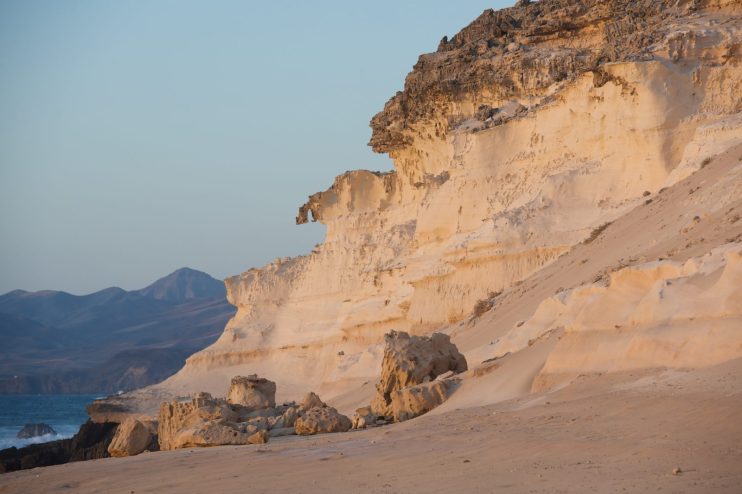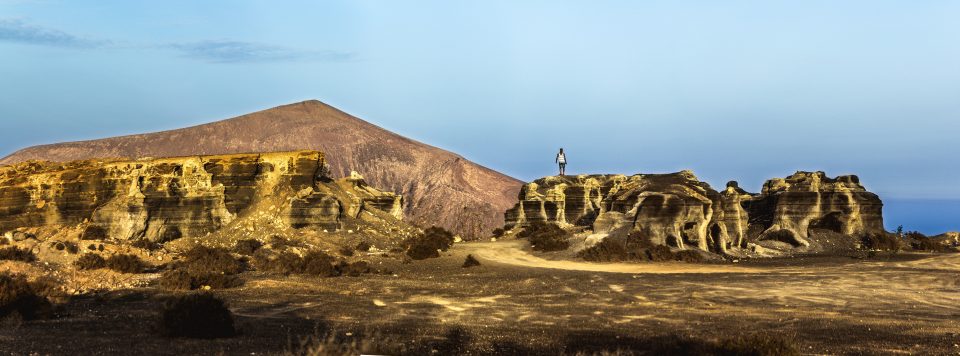The Hollywood of Europe: How the Canary Islands are being reinvented as a film hub

In the opening scenes of action-thriller Jason Bourne, the film’s forgetful hero, played by Matt Damon, strides through violent protests on the streets of Athens.
He meets his spy partner in the iconic Syntagma Square, before being chased through a sea of blue and white flags by a menacing CIA hit squad.
But for eagle-eyed viewers, the film’s dramatic opening betrays a secret: this is not Athens. Nor, in fact, is it even Greece. Damon and his fellow cast members are actually in Tenerife, the largest of the Canary Islands.
The islands may seem an unlikely choice as an ersatz Athens, but the producers of the 2016 blockbuster are not alone. Over recent years the Spanish archipelago has attracted increasing interest from major industry figures, as authorities attempt to transform the sun-soaked holiday destination into a bona fide film hub.
Sun, sea and sets
Ever since Spanish dictator General Franco began to open his country up to visitors in the 1960s, the Canary Islands have grown in popularity as a holiday destination.
The islands now attract more than 15m holidaymakers each year — roughly a third of whom are Brits — who are lured in by warm temperatures, more than 300 days of sun each year and a short flight time from mainland Europe.
But these qualities also prove enticing to producers on the lookout for locations for films, TV shows and advertising campaigns.
Aside from Jason Bourne, other recent blockbusters to be filmed on the islands include Star Wars spin-off Solo, Fast and Furious 6 and fantasy double bill Clash of the Titans and Wrath of the Titans, starring Rosamund Pike, Ralph Fiennes and Liam Neeson.

Christoph Dupont, chief executive of Lanzarote-based Paraiso Productions, says filmmakers are attracted by both the weather and the landscape, which ranges from beaches and jungles to mountains and deserts.
“We have a great diversity of locations, you can find absolutely everything in the Canary Islands,” he says.
Dupont, who has been based in the islands for seven years, adds that both the infrastructure and workforce are in place to help film projects.
“You can come with just with the idea and the creativity, we have absolutely all the materials,” he says.
Catching a tax break
The biggest pull for the film industry, however, is a string of financial incentives offered by the islands’ film board.
Foreign productions made in the Canary Islands are entitled to a 50 per cent tax rebate on the first €1m they spend, with a 45 per cent deduction thereafter. Newly-incorporated companies also enjoy a reduced corporate tax rate of just four per cent, while the islands benefit from zero VAT.
The use of tax breaks for the film sector is not uncommon, but the islands’ offerings exceed the deals available elsewhere in Europe.
The financial pull means that aside from filming, the Canary Islands are also becoming a hotspot for post-production and, in particular, animation.
One of the first companies to set up shop on the islands after the tax breaks were introduced in 2016 was the animation arm of Mondo TV, a Rome-based productions and distribution group.
Enrico Martinis, who leads the company’s animation studio in Tenerife, says the tax incentives are “for sure the best in Europe”.
Not only do they make the work more affordable than outsourcing to the traditional animation hub of Asia, he says, but the location also means his staff can be working on the same time zone.

Tourist troubles
For the Canarian government, developing the islands’ reputation as a film hub has been a priority in recent years.
“The Canary Islands have had a long-term strategy of putting themselves on the map in the film industry,” says Pamela Rolfe, who covers the Spanish film industry for The Hollywood Reporter.
“They were very savvy about becoming the place for international buyers to see Spanish films back in the early and mid 2000s, so there’s been a policy of attracting international attention for a while.”
The motivation for authorities in the region is two-fold: to reduce the reliance on tourism and to stem the tide of young people moving abroad to find jobs. Alongside tax breaks, authorities are also focusing on fostering a new generation of talent to work in the islands’ growing film industry.
Yet the shift has been given even greater urgency since the outbreak of Covid-19, which has laid bare the area’s economic reliance on tourism. The islands attracted just 13,500 visitors in June, compared to 1.1m in the same month last year.

The pandemic has also devastated the global film industry, with productions forced to shut down as a result of the crisis. But the Canary Islands is taking solace in its animation sector, which has proved resilient to coronavirus.
“Animation got a big boost thanks to Covid as we were maybe one of the only audio-visual products that could continue producing,” says Martinis.
Mondo TV has had even more work than normal, he says, with the company aiming to double its workforce to 80 next year.
“The arts are part of the culture here on the island and the government wants to make it a hub for animation,” he says, adding that animation projects have the added benefit of attracting longer-term projects.
Whether booming animation will be sufficient to offset the production slump remains to be seen. But with huge demand for film and TV production to fuel the intensifying streaming wars, industry bosses on the islands remain optimistic about the sector’s future.
“I think it could be the Hollywood of Europe,” says Rolfe. “All of Spain has been hit because of Covid and the Canaries are no exception, particularly since it’s such a tourism-focused economy. But the Canaries have a lot more to offer beyond tourism and the film business is a clear example of that.”